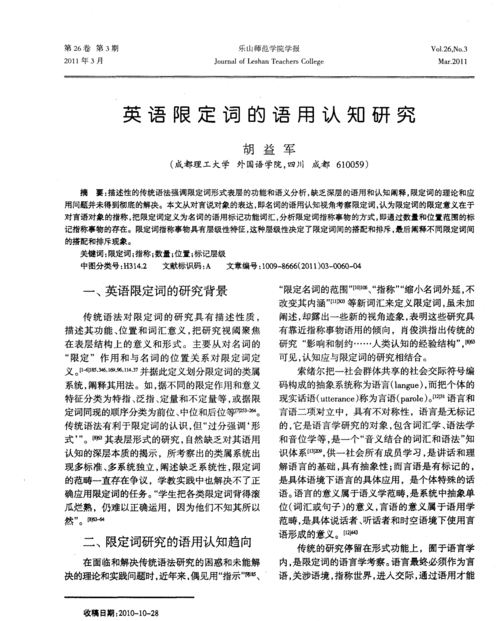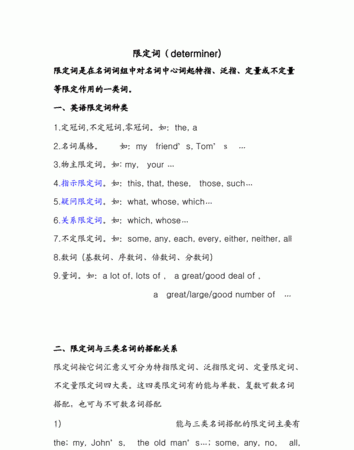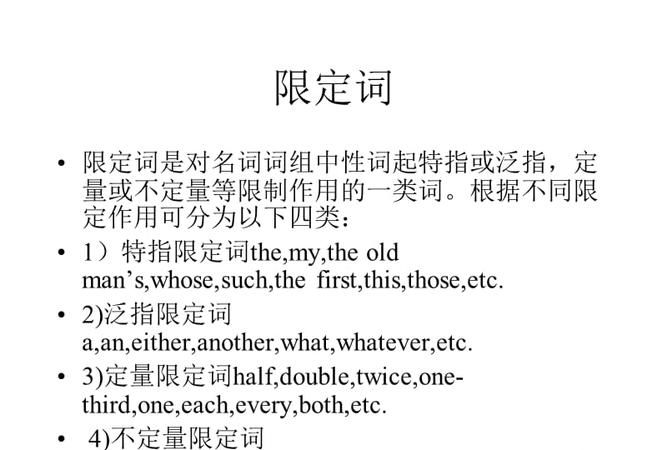本文目录
说明文中常见的限定词有哪些
限定词是在名词词组中对名词中心词起特指、类指以及表示确定数量和非确定数量等限定作用的词类。名词词组除有词汇意义外,还有其所指意义,是特指(即指特写的对象),还是类指(即泛指一类人或物〕;是有确定的数量,还是没有确定的数量。能在名词词组中表示这种所指意义的词类就是限定词。
基本简介 1、冠词(article)
定冠词(DEFINITE
ARTICLE),
不定冠词(INDEFINITE
ARTICLE),零冠词(ZERO
ARTICLE)
2、形容词性的代词物主限定词(POSSESSIVE
PRONOUN
DETERMINER),my,
your,
his,
her,
our,
your,
their,
one's,
its.
名词属格(GENITIVE
NOUN),John's,
my
friend's.
指示限定词(DEMONSTRATIVE
DETERMINER),this,
that,
these,
those,
such.
关系限定词(RELATIVE
DETERMINER),whose,
which.
疑问限定词(INTERROGATIVE
DETERMINER),what,
which,
whose.
不定限定词(INDEFINITE
DETERMINER),no,
some,
any,
each,
every,
enough,
either,
neither,
all,
both,
half,
several,
many,
much,
(a)
few,
(a)
little,
other,
another.
3、数词(numeral)
基数词(CARDINAL
NUMERAL)
和序数词(ORDINAL
NUMERAL)
倍数词(MULTIPLICATIVE
NUMERAL)
和分数词(FRACTIONAL
NUMERAL)
4、量词(QUANTIFIER)
a
lot
of,
lots
of,
plenty
of,
a
great
of,
a
good
deal
of,
a
large
of,
a
small
amount
of,
a
quantity
of,
a
great
of,
a
good
number
of等。

限定词有哪些
1、冠词(article) 定冠词(DEFINITE ARTICLE),限定词不定冠词(INDEFINITE ARTICLE),零冠词(ZERO ARTICLE)
2、形容词性的代词物主限定词(POSSESSIVE PRONOUN DETERMINER),my, your, his, her, our, your, their, one's, its.
名词属格(GENITIVE NOUN),John's, my friend's.
指示限定词(DEMONSTRATIVE DETERMINER),this, that, these, those, such.
关系限定词(RELATIVE DETERMINER),whose, which.
疑问限定词(INTERROGATIVE DETERMINER),what, which, whose.
不定限定词(INDEFINITE DETERMINER),no, some, any, each, every, enough, either, neither, all, both, half, several, many, much, (a) few, (a) little, other, another.
3、数词(numeral) 基数词(CARDINAL NUMERAL) 和序数词(ORDINAL NUMERAL) 倍数词(MULTIPLICATIVE NUMERAL) 和分数词(FRACTIONAL NUMERAL)
4、量词(QUANTIFIER) a lot of, lots of, plenty of, a great of, a good deal of, a large of, a small amount of, a quantity of, a great of, a good number of等。
EG:

常见的限定词有哪些
限定词如下:
1、this:英语单词,发音:[英][ðɪs][美][ðɪs]。常翻译为:这,这么。
2、whose:英语单词,主要用作代词,代词时意为“谁的(疑问代词)”。
3、such:英文单词,形容词、名词,作形容词时意为“这样的,如此的”,作名词时意为“人名;(英)萨奇;(德)祖赫”。

4、what:什么;多么;多少;到什么程度,在哪一方面。
5、these:英文单词,主要用作限定词、代词、形容词,作限定词时意为“这些”,作代词时意为“这些”,作形容词时意为“这些”。
一般是什么限定词
限定词必须根据“单数或复数”和“可数或不可数”的情况修饰它后面的名词。
An(or Every, Each, Another, This, That, Such a, A certain) egg(单数可数名词) is rotten.
Both( or Several,Three, Few, A few,Those, These,Many,A large number of) eggs(复数可数名词) are rotten.
Little(or A little,Much,A great deal of,A large quantity of,This,That)milk(不可数名词)was spoiled.
Some(or No, An abundance of,A lot of,Plenty of,Enough,All,My,John's,The,Any,Such)eggs(复数可数名词) have been sold. Some(or No,An abundance of,etc.) milk(不可数名词) has been sold.
If you have much money,you have many friends;if you have a little money,you have a few friends;if you have very little money,you have very few friends;and if you have no money,you have no friends.

以上就是关于中文常见的限定词有哪些 ,说明文中常见的限定词有哪些的全部内容,以及中文常见的限定词有哪些 的相关内容,希望能够帮到您。

